Travel Safety & Security
Travel safety and security are paramount concerns for any traveler, whether you're embarking on a short domestic trip or an extended international journey. Ensuring your well-being while navigating unfamiliar environments requires a blend of cautious planning, vigilant awareness, and thoughtful action. This article delves into the key aspects of travel safety and security, offering insights into pre-travel preparations, situational awareness, and response strategies for potential threats.
Pre-Travel Preparations
Effective travel safety begins well before you set foot on foreign soil. Comprehensive research and preparation can significantly reduce risks and enhance your confidence as you travel. Start by researching your destination thoroughly. Understand its political climate, local laws, and cultural norms. Websites like the U.S. Department of State’s travel advisories or the equivalent from other countries are valuable resources for updated safety information.
Another important pre-travel step is to ensure you have the necessary travel documents in order. This includes a valid passport, visas (where applicable), and international driving permits if you plan to rent cars. It’s wise to make digital and physical copies of all essential documents, including passports, visas, insurance policies, and emergency contact information. Share copies with trusted family or friends who can assist remotely if necessary.
Health precautions are equally critical. Check if your destination requires specific vaccinations or health certificates. Carry a basic first aid kit that includes personal medications, antiseptics, and over-the-counter remedies for common ailments. Consider purchasing travel insurance that covers medical emergencies, trip cancellations, and theft.
Situational Awareness
Staying safe while traveling is heavily reliant on maintaining situational awareness. This begins with understanding and respecting local customs and behaviors. Dress appropriately to avoid drawing unwanted attention and always move with a sense of purpose. Being inconspicuous helps in blending in and reducing the likelihood of becoming a target for scams or crime.
Accommodations play a huge role in your safety. Choose hotels or rentals in secure neighborhoods, and read reviews from multiple sources to gauge their safety. Upon arrival, familiarize yourself with the emergency exits and the location of safety equipment like fire extinguishers. Use hotel safes to store valuables and documents, and always lock your doors and windows when leaving the room.
While exploring, use maps or GPS discreetly to avoid broadcasting that you are a tourist. Avoid displaying large amounts of cash or expensive items openly. Keep your wallet and passport in a secure and hard-to-reach location, and consider using anti-theft bags that come with RFID-blocking technology to protect against electronic pickpocketing.
Transportation Safety
Transportation is an integral part of any travel experience, and it comes with its own set of safety considerations. If renting a car, ensure it is from a reputable company and always inspect the vehicle before use. Familiarize yourself with the local driving laws and road conditions. Always use seat belts and keep your valuables out of sight.
For public transport, be wary of crowded places like bus stops or transit stations, which are often hotspots for pickpockets. In taxis or ride-shares, verify the driver's identity and the car's registration before getting in. Use official taxi stands and avoid unmarked vehicles. Track your route using a GPS app to ensure you are not being diverted.
Pedestrian safety is also crucial. Follow local traffic laws, use pedestrian crossings, and remain vigilant, especially in congested urban areas where traffic patterns may differ from what you're accustomed to. Pay particular attention when crossing streets and avoid distractions like mobile phones that can impair your awareness.
Personal Safety
Your personal safety involves more than just physical security; it also includes safeguarding your emotional and psychological well-being. Trust your instincts. If something feels off, it probably is. Avoid isolated areas, especially at night, and rely on well-lit, populated places. If you’re out socializing, never leave your drink unattended to avoid the risk of being drugged.
In case of emergencies, being prepared can make a significant difference. Carry a whistle or personal alarm, and know how to reach local emergency services. Many countries have different emergency numbers for police, fire, and medical services, so it’s prudent to memorize or have these numbers easy to access.
Tech Security
In today’s digital age, travel safety also extends to protecting your electronic devices and online information. Use strong, unique passwords for your devices and online accounts. Enable two-factor authentication wherever possible. Avoid using public Wi-Fi for sensitive transactions like banking; instead, use a VPN to encrypt your internet connection.
Regularly back up your data to a secure cloud service or external drive. Should your device be lost or stolen, you can still access your important information from another device. Keep your devices' software and antivirus programs up to date to protect against security vulnerabilities.
Financial Security
Ensuring your financial security while traveling involves a mix of prudence and preparedness. Inform your bank and credit card companies about your travel plans to prevent them from flagging your international transactions as fraudulent. Carry multiple cards to mitigate the risk if one gets lost or stolen.
Use ATMs in secure locations, preferably inside banks. Avoid using ATMs at night or in isolated places. Monitor your bank statements regularly to catch any unauthorized transactions early. Consider using travel money belts or hidden pouches to carry cash discreetly.
Communication Plan
A robust communication plan is essential for maintaining safety during travel. Share your itinerary with family or friends and check in regularly. Establish a check-in protocol where you reach out at predefined times. Communicating via a reliable platform that works internationally, like WhatsApp or Signal, is beneficial.
In regions with limited connectivity, consider purchasing a local sim card for better access to mobile networks. Keep a list of important contacts both digitally and on paper, including local emergency contacts, your country's embassy, and your accommodation.
Managing travel safety and security effectively requires a proactive and vigilant approach throughout your journey. By preparing comprehensively, maintaining situational awareness, and staying informed, you can significantly mitigate the risks and enjoy a safer, more secure travel experience.
Sydney, Canberra Security Road Closures, Airport Delays

Port au Prince Flight Ban Runs to March 7

Ecuador Protest Alerts, Road Blockages Risk

Jordan Protests Road Checks Delay Amman Transfers

Lufthansa Power Bank Ban on Flights Starts Jan 15

Labadee Haiti Port Pause Hits Royal Caribbean 2026

Amman Security Alert, Add Roadblock Buffers Jan 16

Grenada Travel Advisory Raised To Level 2 January 5

Warsaw US Embassy Protest Delays Aleje Ujazdowskie

Antigua Entry Rules Unchanged, Tourism Issues Statement
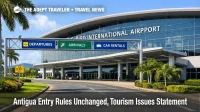
Labadee Haiti Cruise Stop Canceled on Royal Caribbean 2026

Venezuela Security Alert, Depart Immediately Guidance
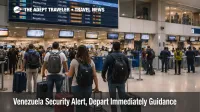
Grenada Level 2 Travel Advisory Adds Crime Warning
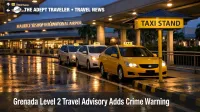
UK Benin Travel Advice Expands No Travel Zones
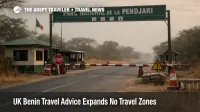
Colombia ELN Armed Strike Restricts Travel Dec 14 to 17
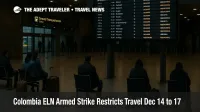
Guatemala Emergency Decree Disrupts Sololá Roads

Goma Airport Closed, DR Congo Security Alerts Rise
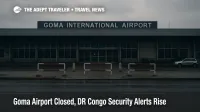
Champs Élysées Concert Canceled, December 31, 2025

Lima Emergency Extended, Rainy Season Closes Roads
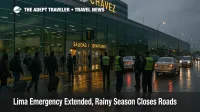
Ecuador Curfews Keep Night Airport Transfers Risky
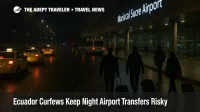
Madagascar Advisory Level 2, Hotspots Still Flagged
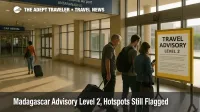
Mauritius Crime Advisory Level 2, December 2025
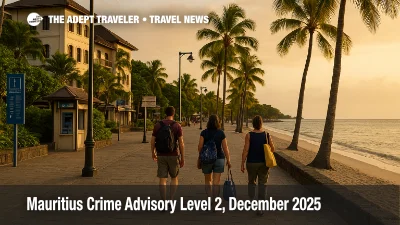
Costa Rica Crime Alert For Vacation Rentals, ATMs

Costa Rica Crime Alert Hits Vacation Rentals

Cartagena Independence Events Tighten Security

